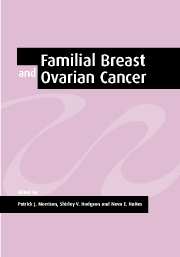Book contents
- Frontmatter
- Contents
- List of contributors
- Foreword by Helena Kennedy
- Preface
- Acknowledgements
- Part 1 Molecular biology and natural history
- Part 2 Screening
- 9 Developing a cancer genetics service: a Welsh model
- 10 Referral criteria for cancer genetics clinics
- 11 Guidelines for the development of cancer genetics services
- 12 Cultural and educational aspects influencing the development of cancer genetics services in different European countries
- 13 Screening, detection and survival patterns of breast and other cancers in high-risk families
- 14 Screening for familial ovarian cancer
- Part 3 Management
- Index
12 - Cultural and educational aspects influencing the development of cancer genetics services in different European countries
Published online by Cambridge University Press: 24 August 2009
- Frontmatter
- Contents
- List of contributors
- Foreword by Helena Kennedy
- Preface
- Acknowledgements
- Part 1 Molecular biology and natural history
- Part 2 Screening
- 9 Developing a cancer genetics service: a Welsh model
- 10 Referral criteria for cancer genetics clinics
- 11 Guidelines for the development of cancer genetics services
- 12 Cultural and educational aspects influencing the development of cancer genetics services in different European countries
- 13 Screening, detection and survival patterns of breast and other cancers in high-risk families
- 14 Screening for familial ovarian cancer
- Part 3 Management
- Index
Summary
There is a rapidly increasing appreciation of the importance of familial cancer susceptibility and the potential for the identification and surveillance of at-risk individuals with a strong family history of cancer to reduce morbidity and mortality from the disease.
The development of healthcare strategies for the identification of individuals with a risk of familial cancer susceptibility, for stratifying their risk and for developing agreed surveillance protocols is dependent on many factors, which will differ in different countries. This service development requires a partnership between clinicians, service providers and purchasers, and healthcare planners. Evaluation of the cost-effectiveness of such a service is vital. In many countries this service was initially funded by research charities. However, funding is now being transferred to the public sector as the research questions are answered.
There is a good deal of inequality in the sophistication of cancer genetics services in different countries, and those countries initiating service development should be enabled to benefit from the experience of others with established services.
This type of service has several levels; (1) there is a need for ascertainment and prioritization of referrals at the primary care level; (2) there should be an agreed management care pathway for the surveillance of individuals at different degrees of estimated moderate risk; and (3) there should be provision for genetic counselling and testing of individuals from families in which there is a high chance of an inherited susceptibility to specific cancers.
- Type
- Chapter
- Information
- Familial Breast and Ovarian CancerGenetics, Screening and Management, pp. 194 - 203Publisher: Cambridge University PressPrint publication year: 2002
- 1
- Cited by



